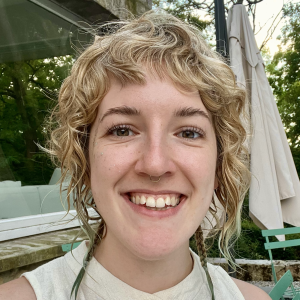Cultivating Climate Transformation
2025
Why Cultivating Climate Transformation?
We are living through a time of accelerating disruption - ecological breakdown, social fragmentation, and political instability. These challenges cannot be solved through technical fixes alone; they require a deep shift in how we understand the world and our place within it. Traditional ways of making meaning - rooted in linear thinking, separation, and control - are breaking down under the weight of complexity. In their place, we need new ways of seeing, sensing, and responding: ways that are relational, adaptive, and grounded in interdependence.
Cultivating Climate Transformation is a six-month learning journey that supports you to reorient and respond systemically in the face of uncertainty. Through a multi-method curriculum, you’ll explore a range of transformative approaches and practices for facilitating systems change in your context. Sessions are enriched by guest contributors who share insights from their own frameworks and experience.
You’ll receive three one-to-one (1:1) coaching sessions with a member of our facilitation team, offering space to reflect on how the learning applies to your work, explore your inquiry questions, and deepen your ongoing experiments. Throughout, you'll engage in action inquiry - applying what you're learning in real time to your own context and live challenges, supported by the facilitation team and a peer learning community.
This course is well-timed for those engaging in key climate gatherings like COP30 and Climate Week NYC, offering a space to prepare, reflect, and integrate learning around these critical events. Whether or not you attend these gatherings, the course provides relevant content, coaching, and community to support your practice in navigating complexity and leading systemic change.
What you will learn
Learning outcomes
Through three modules and 1:1 coaching, you will learn to:
- Discern your evolving role in systems change: Act from a grounded sense of self, contributing in ways attuned to your gifts, context, and the wider field.
- Design processes with intentionality and adaptability: Confidently apply a diverse range of methods to support transformation in complex environments.
- Navigate complexity in groups with presence: Facilitate and host space for difference and catalyse collaborative action.
- Engage as a relational and reflexive practitioner: Work through cycles of inquiry applied to your challenge context - acting, reflecting and adapting in ways that bring about internal and external change.
How you will learn
At the School, we believe there is no one ‘right’ way of doing systems change work, and embrace both multiple methodologies and multiple ways of learning. In this course, we host you through a combination of participatory online workshops, personal reflective exercises, contributor sessions (experienced practitioners from various backgrounds who introduce their frameworks and approaches), and three 1:1 coaching calls with one of our facilitation team. You will also be asked to take your learning away and apply it to your work, with our support.
Course Modules
Module 1: Sensemaking in complexity
Mon 8, Tue 9 & Wed 10 September (3 half-days)
- How might we sense and make sense of what is unfolding within and around us?
- How might we identify and step into our unique role in this time of systemic disruption?
This opening module supports you to make sense of the world around you through a systems and complexity lens. You will cultivate the inner clarity and perspective needed to navigate uncertainty with agency and purpose.
Module 2: Facilitating and organising for change
Mon 27, Tue 28 & Wed 29 October (3 half-days)
- How might we navigate the complexity of multiple worldviews and perspectives in the groups we facilitate?
- How might we bridge the gap between intention and implementation as we plan and organise for change?
This module builds your facilitative capacities. You will explore how to navigate tensions, design effective processes, and organise in ways that support collaboration, adaptability, and emergence.
Module 3: Strategic learning for change
Mon 15, Tue 16 & Wed 17 December (3 half-days)
- How do we make conscious, strategic choices in complex systems?
- How might we experiment and evolve our practice in ways that are relevant to our unique contexts?
In this final module, you’ll be introduced to frameworks that help to navigate complexity, integrate what you’ve learned, and design your next steps. Through individual reflection, peer coaching, and applied inquiry, you will identify how to carry your practice forward—clarifying what to deepen, adapt, and experiment with in your specific context.
Course Team
Facilitators
Producer
Cohort
Is the course for me?
This course is right for you if:
- You have a strategic role working in climate and want to grow your skills to scale your impact.
- You are looking to learn about systemic change and are interested in learning and applying multiple methods and approaches.
- You are keen to experiment with new tools and approaches to foster a deeper understanding of how to work more systemically, and are positioned to apply your learning in specific climate projects and initiatives.
- You are interested in engaging wholeheartedly with a learning community and in learning from others working in climate and climate-adjacent fields.
- You are ready to dive into the unknown, challenge your assumptions, and do what it takes to get the most out of this course.
Though not limited to these areas, those working in the built economy, renewable energy, climate education, climate policy and governance; and land, food system and agriculture are encouraged to apply.
If you are looking for a shorter introduction to systems change, our Delta course might be right for you.
Who else will be on the course?
This course is designed for a cross-section of climate and environment professionals who can influence climate work happening at a regional, national or local level, such as:
- Climate philanthropy and investments portfolios
- Nonprofits and grassroots organizations working on climate and related issues
- Private sector entities furthering commitments to sustainability
- Climate policy advisors and public interest advisors at a international/regional, national or local level
- Those with technical backgrounds related to climate and environment
- Place-based community representatives driving climate action
- Those working in climate innovation and education
Equity & Diversity
We seek to create safe and brave spaces for participants from different backgrounds and lived experience to engage in learning together. We acknowledge the power and responsibility we hold in our role as a convenor and learning provider, placing multiple ways of knowing and awareness of difference as fundamental design principles in our programmes.
Read more about our commitment and journey around equity and difference here.
Accessibility needs
If you anticipate requiring additional support for your wellbeing, learning or access needs during the course, then please let the team know as soon as possible, so we can factor this into our session design. You can let us know in the application form or email us at [email protected]. We are happy to arrange a call to discuss how we can support your learning. The course producer will also be on hand throughout the course if you have any questions or concerns to raise.
Date & Time
- Information sessions
- Wed 9 July 2025, 09:00 ET / 14:00 BST / 15:00 CEST
- Tue 12 August 2025, 10:00 ET / 15:00 BST / 16:00 CEST
- Application deadline: Friday, 15 August 2025, 17:00 BST
Course dates
- Pre-course coaching call: To be scheduled individually across the weeks of 25 August and 1 September
- Module 1 sessions: Mon 8, Tue 9 & Wed 10 September (3 half-days)
- Contributor session 1: Mon 15 September
- Mid-course coaching call: To be scheduled individually across the weeks of 13 October to 7 November
- Module 2 sessions: Mon 27, Tue 28 & Wed 29 October (3 half-days)
- Contributor session 2: Mon 3 November
- Module 3 sessions: Mon 15, Tue 16 & Wed 17 December (3 half-days)
- (Includes contributor session 3)
- End-of-course coaching call: To be scheduled individually across the weeks of 12 January to 6 February 2026
Timing
Each module session will be 4 hours (with breaks) held: 09:00-13:00 ET | 14:00-18:00 BST/GMT | 15:00-19:00 CEST/CET.
Each contributor session will be 2 hours held: 10:00-12:00 ET | 15:00-17:00 BST/GMT | 16:00-18:00 CEST/CET. Except contributor session 3 which will be held during module 3.
You can join this course from anywhere in the world, so long as you can attend the dates and times listed above.
Participants must commit to participating in all of the online sessions and contributing constructively to peer group learning, as much as possible. You can join from anywhere in the world, so long as you can attend the times listed above.
Time commitment between sessions
We recommend around 3 hours per week between sessions. Please note that this includes your individual coaching sessions, as well as the time you spend taking the content into your work or even mulling it over in the shower! We give this estimation as a rough guide so you know what to expect - this is very much a 'the more you put in, the more you get out' situation.
Course Fees
The fees for this course are subsidised thanks to the contribution of our programme partner Cisco Foundation. Places are limited, and successful applicants will be asked to make a contribution towards the cost of running the programme.
The full cost of the programme is around £4,140 per person. We therefore ask for a contribution of between £3,500 and £500, depending on your ability to pay. Please refer to the tiers below for guidance in deciding how much to contribute, but be reassured that we do not want fees to be a barrier to entry, so offer what you are able.
Full rate: £3500 GBP / €4100 EUR / $4400 USD
For people in countries with strong economies, larger organisations and well-paid professionals.
Middle rate: £1500 GBP / €1800 EUR / $1950 USD
For people in countries with moderate economies, small organisations (fewer than 10 employees) and individuals
Discounted rate: £500-1000 GBP / €600-1200 EUR / $650-1300 USD
For people in need of financial assistance to support their learning. Only a few discounted rate slots are allocated to each cohort.
Please note that the course fee contribution is nonrefundable and VAT does not apply.
If you have any questions about course fees - or if cost is a barrier to your participation - please reach out to us at [email protected]. Further financial assistance is available, and we’re committed to working with you to make the course accessible. You can apply for this when you complete your application.
Info Sessions
Please join the course team for a 45-minute information session to learn more and to ask questions:
- Wed 9 July 2025, 09:00 ET / 14:00 BST / 15:00 CEST
- Tue 12 August 2025, 10:00 ET / 15:00 BST / 16:00 CEST
Apply
Contact Us
Want to speak with one of our team to answer any specific questions? Please email us at [email protected]. We look forward to hearing from you!
About Cisco Foundation
Cisco Foundation envisions a world of resilient and empowered communities where everyone can reach their full potential and thrive. Its mission is to collaborate with organizations to create and scale innovative digital solutions that promote a healthy planet and advance the wellbeing and self-reliance of underserved communities globally. Since 1997, it has harnessed the breadth of offerings from Cisco (NASDAQ: CSCO), the worldwide technology leader helping revolutionize the way organizations connect and protect in the AI era, for strategic guidance, catalytic funding, technology donations and other support.








